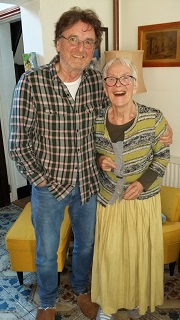Award-winning new technology developed by the NHS, academia and industry to help people with dementia live well for longer at home has received CE mark approval, paving the way for pilots across England.
Technology Integrated Health Management (TIHM) for dementia uses digital devices installed in a person’s home in combination with artificial intelligence (AI) to remotely monitor their health and provide clinicians with a continuous assessment.
It has been developed by mental health trust, Surrey and Borders Partnership NHS Foundation Trust, in partnership with the Centre for Vision, Speech and Signal Processing at the University of Surrey and smart home monitoring provider, Howz, with support from The Alzheimer’s Society.
Sensors monitor activity including sleep; while devices track vital signs such as blood pressure, hydration, and temperature; and Artificial Intelligence detects changes in behaviour and possible signs of infection.
If the technology identifies a concern, an alert is flagged and prioritised on a digital dashboard and followed up by a monitoring team.
Prototype algorithms can identify if a person has a urinary tract infection, a top-five cause of hospital admission for people with dementia. And, if they are becoming agitated, this may be a potential sign they are becoming unwell.
The aim of TIHM is to reduce pressure on the healthcare system as well as improve the lives of people with dementia and their carers.
Its approval as a CE-marked medical device by the Medicines and Healthcare products Regulatory Agency (MHRA) means TIHM meets legislation relating to safety and performance and can be promoted in the UK and across Europe.
In the UK, there has been a surge of interest in the pioneering system and pilots are about to begin with Birmingham Community Healthcare NHS Foundation Trust and GPs in Middlesex.
Surrey County Council, along with a number of other healthcare providers, is also considering piloting the system.
Helen Rostill, director of innovation, development and therapies, at Surrey and Borders Partnership, and Professor at the University of Surrey, said: “Our clinicians have worked closely with the technicians at the University of Surrey and the team at Howz to create TIHM and we are delighted it has received CE mark approval, enabling us to launch these pilots.
“Independent research shows TIHM makes people feel safer, better supported, and more confident about being able to stay in their homes for longer.
“In the future, we believe we can adapt TIHM further to support people with other healthcare needs.”
TIHM for dementia is part of the NHS Test Bed Programme led by NHS England and the Office for Life Sciences.
It was launched as a randomised control trial involving more than 400 people with dementia and their carers from across Surrey and north east Hampshire in 2016 and was completed in March 2018.
Independent research conducted by the School of Health Sciences at the University of Surrey showed people who had the TIHM technology in their homes experienced a sustained and significant reduction in neuropsychiatric symptoms associated with dementia, such as depression, agitation, anxiety and irritability.
Independent research shows TIHM makes people feel safer, better supported, and more confident about being able to stay in their homes for longer
It also found the system supported early intervention and that people received timely support.
The vast majority of participants said they would recommend TIHM, commenting that it gave them ‘peace of mind’ as a carer.
The positive outcomes led to the launch of a second, smaller phase of TIHM for dementia in April this year to refine the range of devices deployed in homes and to further develop the algorithms. This phase will be completed at the end of this month.
Phillip Bell and his wife, June, have been involved in testing the TIHM for dementia technology in their home in Surrey since the start of 2017.
Mr Bell, who is 69 years old, cares for his wife, who is 76 years old and has dementia with Lewy Bodies.

Phillip Bell and his wife, June, have been using the solution to remain living indepently in their own home for as long as possible
He said: “The objective has been to stay in our own for as long as possible and TIHM helps us to achieve that.
“If we didn’t have the technology; we would start to panic.
“As June’s health has deteriorated, she has become susceptible to picking up more illnesses, so having the support of TIHM is even more important.
“In terms of our quality of life, we feel TIHM helps us to stay at home with more confidence.
“Most of the devices are in the background, collecting information, and we use some on a daily basis to record blood pressure, blood oxygen, temperature and weight, and hydration.
“We had an incident recently where we had just taken all the daily measurements and within an hour we got a call from the TIHM monitoring team who said they thought June had got a urinary traction infection and could we contact our GP.
“We called the surgery and a paramedic came within an hour, confirmed the diagnosis, and prescribed antibiotics.
“So, within a few hours of that initial call, the diagnosis had been confirmed and June was on antibiotics, which was brilliant.
"You just think, ‘wow’, how does that work?”
In terms of our quality of life, we feel TIHM helps us to stay at home with more confidence. You just think, ‘wow’, how does that work?
The technology was named winner of the HSJ Awards 2018 Improving Care with Technology category; and received an NHS70 Parliamentary Award for the South of England in 2018 as winner of the category.
It has also won an ehi Award for Best Mental Health Initiative; and was highly commended in the HSJ Value Awards 2018 in the Use of Information Technology to Drive Value in Clinical Services category.




